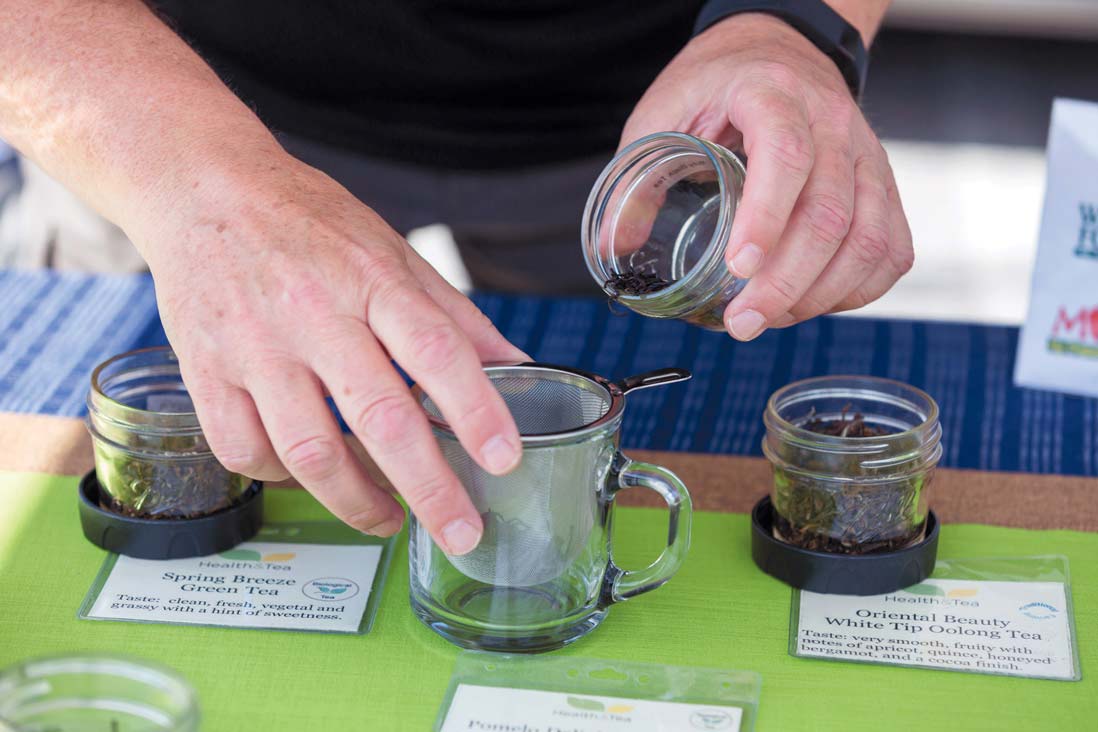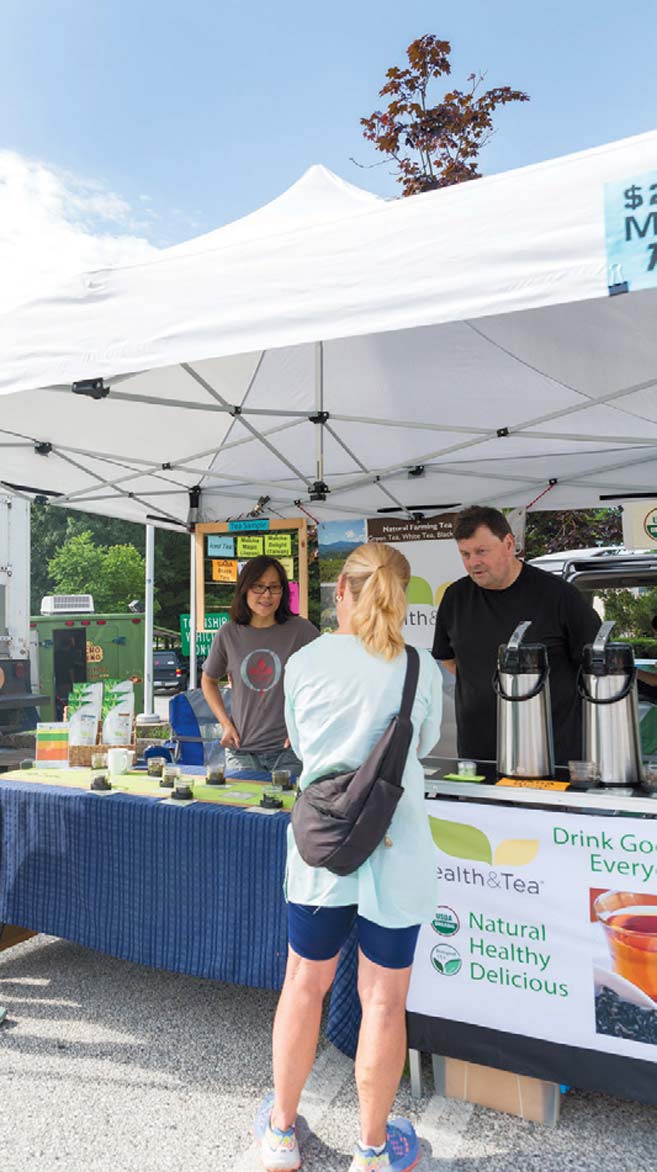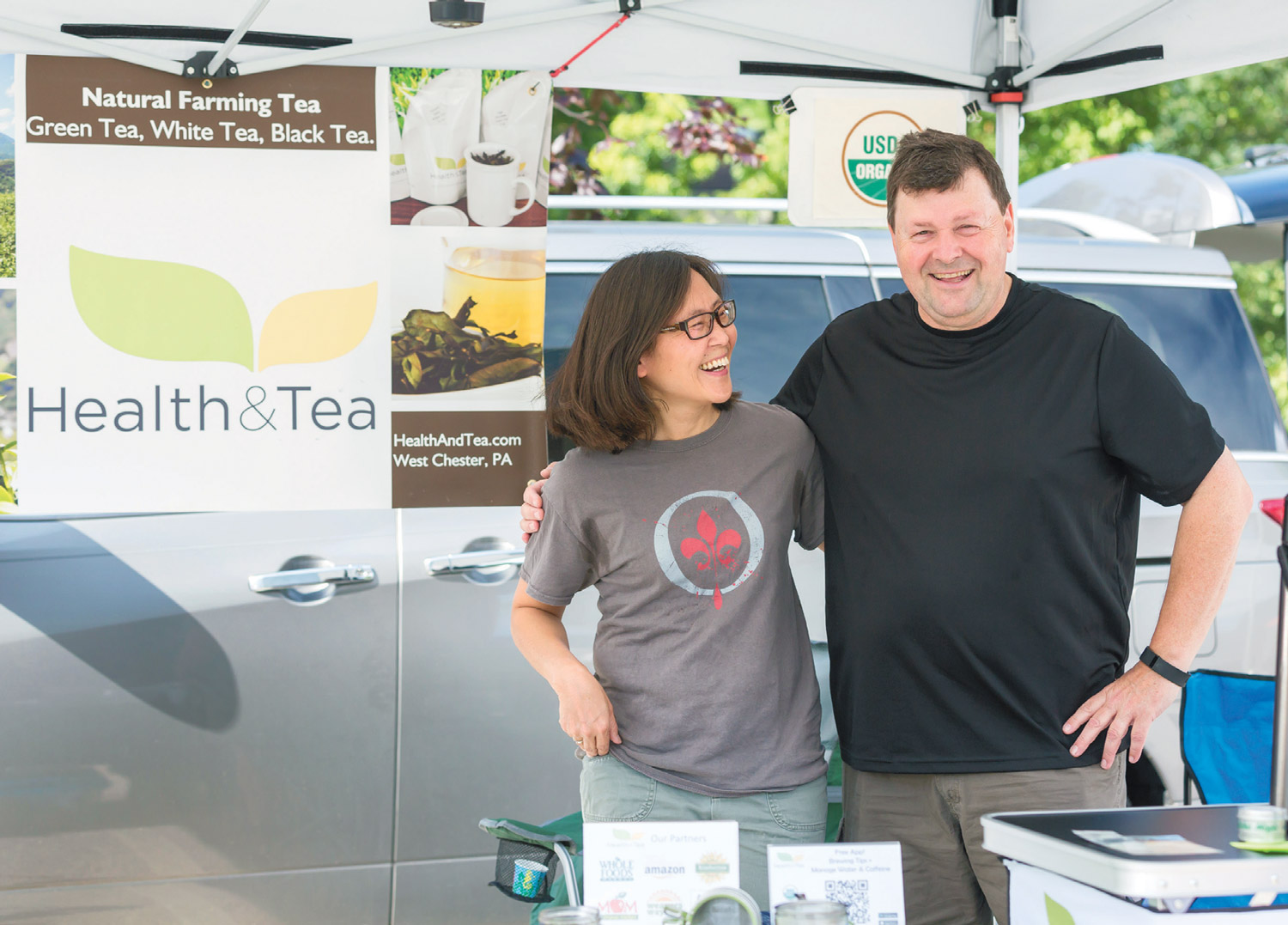Tea for Two
A local couple sells Taiwanese leaves with a French flair
Im a French woman, so you might think coffee would be my thing. But I’m such a serious tea drinker that my kettle has four temperature settings. I swapped the convenience of teabags for more flavorful loose tea long ago. Because my preference for the organic kind left me with few local options, I usually ordered my tea online or brought it home from my trips to visit family in France. All of this changed when a serendipitous trip to Whole Foods Market in Glen Mills introduced me to Health and Tea.
Pushing my cart to the dairy aisle one morning, my eye caught a small table set up in front of a neat row of packaged brioches. There, on a blue tablecloth, stood an assortment of organic loose-tea packages and two pitchers of brewed tea. Behind the table, a man in a baseball hat offered samples. I gasped when I read his name on the badge:
“Alain? But you’re French!”
Bonding over our common accent, Alain Boczkowski offered me a cup of Health and Tea’s High Mountain Green Tea and another of its Honey Black iced tea, both of which were sourced during a trip to Taiwan, he said.
To my delight, the green tea tasted fresh and grassy, without any astringency, and the black tea had a subtle sweet flavor stripped of the tannic notes I typically experienced with the brew. Both tasted so smooth that I was hooked. I thanked Boczkowski for the samples and left the store with a package of Health and Tea.
Back home, my first steep of Honey Black revealed large, perfectly formed brown leaves begging to be held. I could picture a farmer plucking them off a bush in a faraway plantation and, sipping my drink, couldn’t help but wonder: what exactly was that tea farmer’s story? When neither the package nor the company website offered that answer, I emailed Boczkowski to learn more.
“He said he could not describe teas on the phone.
He invited us to try his teas instead,
and then he hung up.” The couple booked
tickets to Taiwan soon after.
Health and History
Hearing Boczkowski speak about tea, it’s hard to believe it wasn’t part of his upbringing. He and his wife Liz Wang invited me to their quiet West Chester townhouse, where the Frenchman explained that “real tea” refers only to the leaf of Camellia sinensis, an evergreen shrub from Asia that’s known for its high antioxidant content. “When my neighbor says that she drinks tea at night, she really refers to herbs with no caffeine, which is not tea at all,” says Boczkowski.
All true teas come from that bush: white and green teas consist of non-oxidized or slightly oxidized leaves, while oolong and black teas are partially oxidized and fully oxidized leaves, respectively.
For years, Boczkowski saw tea as “nothing more than hot water” —until his first trip to Taiwan in 2003 introduced him to both his in-laws and the vast world of tea. Because tea is integral to Taiwanese culture, each visit to friends and relatives was accompanied by a cup he couldn’t refuse. There he tried oolong, whose flavors can range from floral to fruity based on origin and processing: “I realized tea had taste!” When he returned to Texas, where the couple lived at the time, he was a tea convert.
His appreciation for the leaf continued to grow, so much that, in 2010, Wang suggested they start their own tea company. Boczkowski liked the idea: the endeavor would fulfill his dream of running his company while leveraging his wife’s knowledge of Taiwan on sourcing trips. Wang’s relocation to Pennsylvania in 2012 gave Boczkowski the final push to leave his corporate job, and the couple launched Health And Tea in 2013. Boczkowski has been committed to the company full time ever since, relying on Wang’s and their teenage daughter’s involvement on weekends—although “they sometimes go on strike,” he says.
Sourcing
Looking at Health and Tea’s minimalistic, almost austere packaging, you’d never suspect that the tea is that good. While the company communicates mostly about the health benefits of tea (the website contains a plethora of references to scientific papers), two topics keep coming up during our conversation: taste and sourcing.
To qualify for use in Health and Tea products, tea must be natural, healthy, and delicious.
“If a tea is good,” Boczkowski explains, “we have no need to hide its natural flavors. I would not use a great Bordeaux wine to make sangria, so why would I hide the taste of a good tea by mixing it with other ingredients?”
In short, you won’t find Earl Grey (which is flavored with bergamot) in Health and Tea’s line-up. You will, however, enjoy the natural chocolate notes of the aptly named Choco Black tea; experience Matcha Delight, a perfectly balanced matcha with a long finish (it’s the only matcha I drink); and discover the refreshing flavor of Honey Dew white tea.
Boczkowski is adamant about sourcing teas from organic farms with either US Department of Agriculture or Taiwanese certification (the latter are marked “biological teas”) because he finds them smoother.
Health and Tea’s founders take great pride in the relationships they’ve built with their farmers. They travel to Taiwan every 12 to 18 months and work directly with tea growers, who frequently ask Wang, “When is Alain coming next?”
The day I visit, Wang tells me the story of their very first tea supplier, a man named Chen whose farming practices aligned with Health and Tea’s philosophy. After identifying him online, Wang proceeded to call the farmer to learn more about the teas. Unfortunately, the exchange did not go as planned.
“He said he could not describe teas on the phone. He invited us to try his teas instead, and then he hung up.”
The couple booked tickets to Taiwan soon after.
That first sourcing trip provided Wang and Boczkowski with an opportunity to meet tea farmers and observe the challenges of organic farming for themselves. They remember a young farmer who, after taking a plantation over from his father, transitioned the farming practices to organic. The change caused a yield decline so steep it jeopardized the future of the farm; while yields eventually caught up, it was not without straining the father-and-son relationship first. As for Chen, he’s been supplying tea leaves to Health and Tea ever since.

Alain Boczkowski demonstrates tea brewing technique at the Upper Merion Farmers’ Market

Success
With their delicious taste and compelling story, Health and Tea’s specialty teas are perfectly suited for in-person sales. Meeting their customers, the couple can convey their “deep care for the products they sell,” as one regular puts it. The family attends the Upper Merion Farmers Market in King of Prussia once a month and the popular Coffee & Tea festivals held yearly in New York City and in Oaks, PA. Last fall, I stopped counting the visitors who stopped by their boothin Oaks to replenish their stash.
Traditional retailers have taken an interest as well. Health and Tea started hitting local shelves one year after its inception, first at Whole Foods Markets, next at Mom’s Organic Market. Today, the teas are sold at Whole Foods Markets stores in six states, plus Washington, DC.
Brewing the Perfect Cup
Over the years, Boczkowski has built a reputation as a master tea brewer. “When my parents visit,” Wang explains, “the first thing they ask in the morning is: ‘Is Alain awake? Can he make tea?’”
Thankfully, the basics of brewing are within anyone’s reach: all the leaves need is the right temperature water, space to expand, and just the right time infusing.
At home, Boczkowski uses basic equipment to prepare tea. He heats water in an electric kettle with three temperature settings, using the highest setting for black and oolong tea and the middle one for green and white varieties. Because the chlorine in tap water adds unwelcome flavor, he uses mineral or filtered tap water.
He infuses the tea in a glass coffee carafe, the contents of which he transfers to a ceramic teapot. He also suggests infusing tea in a French press: “It works great as long as you strain the tea right after it’s steeped.”
Because infusion temperatures and times for each tea vary, the company developed a Health and Tea app to let drinkers access that information easily while also tracking their daily caffeine and water intake. There, you’ll learn that green and white teas steep in 170°F to 180°F water, the former for a couple of minutes, the latter for several more. While their oolongs taste best when infused for 3 minutes in 190°F to 200°F water, their black tea can withstand temperatures close to boiling for longer. Boczkowski encourages experimentation: “Steep any tea for three minutes and try it. You can always adjust temperatures and times next time.”
Looking Ahead
Two years after my first visit, I am back at Boczkowski and Wang’s home to try new teas. They’re proud of the company’s growth: they now carry 15 tea varieties, all sourced from Taiwan, although they are considering a Japanese matcha producer.
Back from the kitchen, Boczkowski offers me a cup of Oriental Beauty, a variety currently under consideration for Health and Tea’s lineup. The subtle jasmine aroma takes me back to balmy summer nights on my grandmother’s balcony. As I bring the cup to my lips, I hope this tea makes the cut: my French press is ready.
HEALTH AND TEA
healthandtea.com





